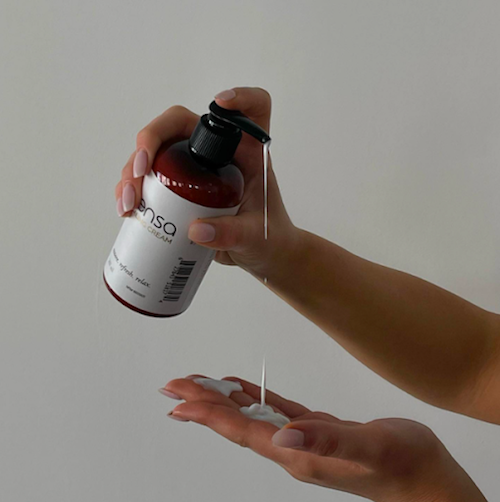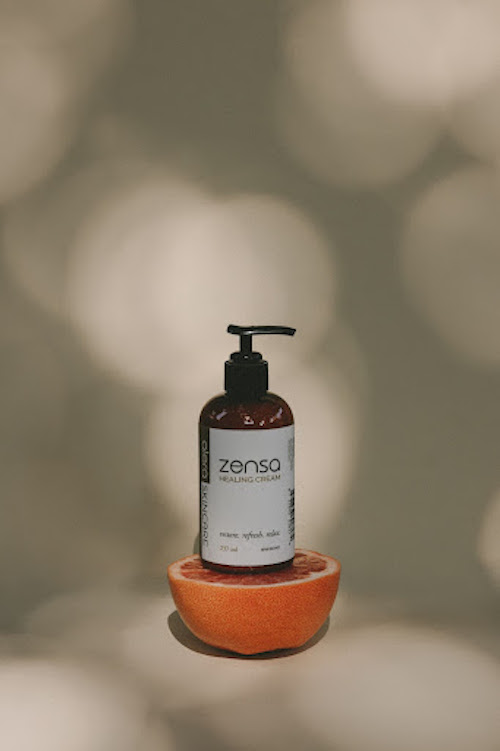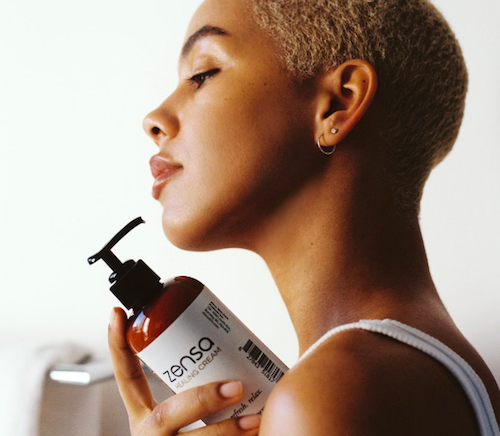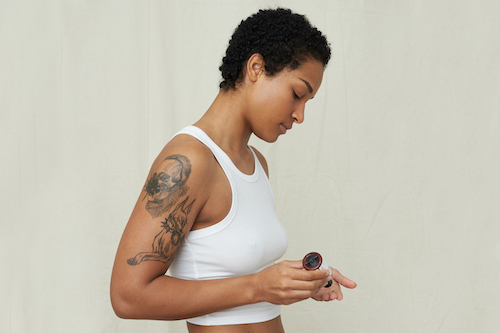Vitamin C For Skin: Benefits, Best Natural Remedies, Uses & More
Vitamin C For Skin: Benefits, Best Natural Remedies, Uses & More
Whether you’re seeking to treat acne, dullness or slow skin aging, Vitamin C is the ingredient that comes close to doing it all. Vitamin C (ascorbic acid) is a potent antioxidant essential for the growth and repair of all the body’s tissues – including its largest organ, your skin. It supports your immune system functioning, stimulates collagen production and promotes wound healing. While a diet filled with vitamin C-rich foods is vital to your overall well-being, topical vitamin C offers the greatest results when seeking a smoother, more radiant and youthful complexion. Vitamin C provides anti-inflammatory benefits to protect the skin against free radical damage from UV rays or other environmental sources, reduces redness, swelling and strengthens the skin barrier to improve uneven skin tone or texture concerns, general skin dryness and helps manage acne or chronic skin conditions like eczema.
Whether you choose to use Vitamin C serums, lotions (like Zensa Healing Cream), toners, eye creams and masks or opt for a diluted essential oil – like lemon, orange or grapefruit essential oil – do your research to ensure you’re purchasing products made with the highest quality ingredients available that are suitable for your skin type.
Read on to learn about the benefits of vitamin C for your skin, how to use it, the dos and don’ts of which ingredients to combine with vitamin C and what to look for when shopping for vitamin C-infused skincare.

Benefits of Vitamin C For Skin:
- Boosts Collagen & Elastin Production
- Reduces Acne & Skin Inflammation
- Improves Skin Hydration
- Promotes Wound Healing
- Protects Against Sun Damage & Pollutants
- Fights Wrinkles & Fine Lines
- Improves Uneven Skin Tone
- Reduces Scar Appearance
- Brightens Complexion
Boosts Collagen & Elastin Production
Vitamin C is essential for collagen and elastin production (proteins naturally produced by the body that provide your skin with structural support and elasticity). While collagen and elastin steadily decrease with age, they can also break down due to unhealthy habits like unprotected or too much sun exposure and lifestyle factors like smoking, poor diet and stress. The amount of collagen and elastin your body produces at any given age also depends on your genetics.
Regardless of the cause, collagen loss leaves you with a less firm, dehydrated and thinner skin texture. This collagen loss results in wrinkles, fine lines, skin sagging and makes your complexion more prone to damage like hyperpigmentation and generally dull, uneven or tired-looking skin. Collagen loss can also cause dry, rough skin texture and make acne scars more visible.
Vitamin C promotes collagen production to improve skin elasticity and hydrate the skin. Increased collagen production encourages cellular turnover and strengthens the skin barrier. These benefits of collagen leave you with a plumper, firmer and smoother skin texture. The more rapid cellular turnover rate prevents clogged pores to reduce acne or dry rough patches. This process also helps consistently resurface the skin to lessen signs of skin aging like wrinkles, fine lines, sagging, hyperpigmentation and help your acne scars appear less noticeable.

Reduces Acne & Skin Inflammation
A 2015 study confirmed that Vitamin C is a powerful anti-inflammatory agent, thanks to its high-antioxidant content. These anti-inflammatory properties soothe redness, swelling and help control sebum (oil) production. A 2010 trial found that applying topical vitamin C twice daily to the skin resulted in decreased acne lesions when compared to the placebo. Citrus essential oils, known for their high vitamin C content, offer these anti-inflammatory benefits along with bacteria-fighting properties to significantly reduce acne. A 2020 study confirmed that regular use of citrus essential oils resulted in the improvement of acne lesions on the skin.
Zensa Healing Cream contains medicinal-grade grapefruit essential oil, which offers antibacterial, antifungal and anti-inflammatory benefits to reduce skin inflammation and infection. Grapefruit essential oil is a natural astringent – meaning it removes excess oil and unclogs pores to clear and control oily or acne-prone skin.
Improves Skin Hydration
Vitamin C is vital to skin health and maintaining the lipid barrier, which keeps the skin hydrated. A 2017 study confirmed that vitamin C plays an essential role in improving skin barrier function. It prevents transepidermal water loss (TEWL) to help the stratum corneum (the outer portion of the skin’s top layer, the epidermis) retain moisture and eliminate skin dryness or rough patches.
With its rich antioxidant content, vitamin C promotes skin elasticity and cellular turnover to keep out irritants that can inflame or dry out the skin. Combine with vitamin E to increase vitamin C’s hydration and anti-inflammatory benefits.

Promotes Wound Healing
Proper skin barrier function is essential for wound healing. Vitamin C is clinically proven to support and speed up the wound-healing process due to its vital role in collagen production and immune system functioning. Its antioxidant content promotes cellular turnover to remove the damaged skin cells and replace them with a fresh layer of healed skin. Vitamin C also keeps irritants out to prevent infections and inflammation (which delay wound healing) and reduces future scar formation. Researchers have found that a vitamin C deficiency not only delays but impairs wound healing. Rich sources of vitamin C, like lemon, orange and grapefruit essential oils, also contain d-limonene (derived from citrus fruit peels), A 2013 study, conducted on diabetic mice, found that d-limonene (a key compound in grapefruit essential oil) reduced wound size and accelerated the healing process.
Protects Against Sun Damage & Pollutants
Thanks to its high antioxidant profile, Vitamin C reduces oxidative stress to reverse and prevent free radical damage caused by the sun’s UV rays, air pollution and other environmental factors. Vitamin C can help reduce the appearance of sunspots and replenish the skin barrier to improve the look of fine lines or UV-induced skin dryness, dullness or sagginess. However, a topical skincare product is unlikely to significantly (or completely) reverse moderate to severe sun damage. Consider microneedling (collagen induction therapy), laser treatments or chemical peels for more transformative results.
Prevention will always be the best protection. While not a replacement for sunscreen, pairing a vitamin C serum, lotion, toner or essential oil with your sunscreen(at least SPF 30) can increase its protective properties against UV rays. Findings from a 2013 study show that coupling an L-ascorbic acid (vitamin C) serum with a broad-spectrum sunscreen considerably reduces sun-induced free radical damage.

Credit: @zensaskin via Intagram/Pinterest
Fights Wrinkles & Fine Lines
Vitamin C is clinically proven to smoothen signs of skin aging for a more youthful complexion. A 2008 study found that patients saw an overall improvement in skin texture and fewer wrinkles after applying topical vitamin C for 12 weeks. The collagen-boosting benefits of vitamin C rejuvenate and plump your skin texture to help fill in wrinkles and fine lines. The antioxidant also strengthens the skin barrier, neutralizes free radicals and helps the skin retain moisture. These benefits of vitamin C protect the skin from sun damage, dryness and thinning skin texture – slowing down the skin aging process.
Improves Uneven Skin Tone
Hyperpigmentation (also called dark spots) occurs when the body produces excess melanin in concentrated areas where there’s cellular damage or trauma to the skin. Common causes of hyperpigmentation include sun damage (sun spots), pollution and previous inflammation from acne, eczema flare-ups, rashes, skin injuries or hormonal changes. Vitamin C offers a dual benefit to help fade dark spots and brighten the skin. It blocks the enzyme responsible for melanin production. Combined with its high antioxidant content, vitamin C’s collagen-stimulating benefits promote cellular turnover to break up the existing melanin clusters and resurface your complexion with a fresh layer of more even-toned skin.

Reduces Appearance of Acne Scars
Vitamin C is known for its wound-healing and skin-brightening properties, making it the perfect topical solution for fading acne scars. Atrophic and hypertrophic scars are two types of acne scars that can form on your skin. Atrophic scars are indented marks caused by the body’s inability to produce enough collagen to resurface the skin during the wound-healing process. Hypertrophic scars are raised bumps that result from the body producing too much collagen and creating excess tissue as the wound repairs.
Vitamin C helps produce collagen to fill in deep-seated scars, promote cellular turnover to decrease hyperpigmentation and exfoliate your complexion to resurface the skin and help flatten raised scars. A 2013 study found that patients using a topical gel containing vitamin C reduced the hyperpigmentation and elevation of fine facial acne scars after 6 months.
When treating acne scars, you need to consider the age and severity of the scar. The deeper (or more elevated) and older the acne scar is, the more intense the scar treatment process will be. Speak with your dermatologist to determine the extent of your acne scarring to see if a vitamin C serum (or lotions or essential oils) is enough to revive your complexion. Consider cosmetic treatments like microneedling for more severe scars.

Brightens Complexion
The exfoliating and collagen benefits of vitamin C brighten the skin by reducing hyperpigmentation and strengthening the skin barrier. Vitamin C inhibits the enzyme that produces melanin (the substance responsible for dark spots), while the high antioxidant content accelerates cellular turnover to resurface your complexion with a healthy, healed layer of skin. The increased collagen production helps plump the skin to fill in deep-seated acne marks and exfoliate away (and thereby decrease the elevation of) raised scars.
Vitamin C also supports your immune system and strengthens the skin barrier to prevent transepidermal water loss (TEWL) and lock in moisture for adequate skin hydration. These benefits of vitamin C can help manage eczema flare-ups (and symptoms of similar chronic conditions), reduce acne and eliminate dry, rough patches (which result from stagnant dead skin cells) – all of which can leave you with a discoloured or dull complexion.
Natural Sources of Vitamin C:
Boost your daily vitamin C intake to enhance its immune-supporting benefits for a healthy body and clear skin. While you want to use the best vitamin C serums and lotions possible, certain natural remedies – herbs, essential oils and acids - can also be applied topically on their own for similar (if not comparable) benefits.
Vitamin C-rich Foods: Tomatoes, Guavas, Kiwi, White Potatoes, Strawberries, Broccoli, Citrus Fruits (Oranges, lemons, limes, grapefruit), Kale, Bell Peppers, Snow Peas Topical Sources of Vitamin C: Aloe Vera, Rosehips, Hibiscus Flowers, Ferulic Acid Vitamin C-rich Essential Oils: Grapefruit Essential Oil, Bergamot Oil, Lemon Oil

How To Use Vitamin C Serums & Skincare:
When building your skincare routine, it’s essential to know which products to use and how to use them. Once you decide on the right products for your skin type, the next step is to learn how to apply them using the correct skincare order. While your morning and night skincare regimens should slightly differ, always wash and moisturize your face twice daily., Here’s how to structure your skincare routine(s) for the daytime and before bed:
Morning Skincare Routine Order:
- Cleanser
- Toner
- Serum
- Eye cream
- Spot treatment(s)
- Moisturizer
- Face Oil
- Sunscreen (Use at least SPF 30)
Night Skincare Routine Order:
- Cleanser
- Toner
- Serum
- Eye cream
- Spot treatment(s)
- Moisturizer
- Retinol
- Face Oil
Expert Tip: A strong, well-nourished skin barrier is the key to a healthy, smooth and glowing complexion. Products like Zensa Healing Cream work as an effective moisturizer to promote collagen production for balanced, younger-looking skin. Our nourishing formula contains medicinal-grade grapefruit essential oil that is packed with vitamin C. We paired it with medicinal-grade calendula oil alongside other antioxidant-rich ingredients to suit nearly every skin type and manage common skin concerns like acne (scars), eczema, redness and dry, itchy skin. Here’s Everything to Know About Zensa Healing Cream.

Dos & Don’ts: What To Mix With Vitamin C:
Do Combine Vitamin C With:
- Vitamin E
- Hyaluronic Acid
- Niacinamide
- Retinol
- Salicylic acid
- Peptides
- Ceramides
- Vitamin B
- Ferulic Acid
Don’t Mix Vitamin C With:
- Alpha Hydroxy Acids (AHAs): Glycolic Acid, Lactic Acid, Malic Acid, Citric Acid, Tartaric Acid
- Beta Hydroxy Acids (BHAs): Tropic Acid, Betaine Salicylate, Salix Acid
Salicylic acid, contrary to popular belief, is not a BHA, but a derivative of benzoic acid. It is still classified as a hydroxy acid but works differently than other AHAs or BHAs. Salicylic acid reduces the thickness of the dermis (middle layer of skin) unlike AHAs or BHAs which thicken the dermis.

How To Shop For Vitamin C Skin Products:
Consider your skin type to determine which form of vitamin C is best for your complexion. If you have normal to oily skin, choose l-ascorbic acid (the most potent and often – beneficial – form of vitamin C) ). For individuals with dry or sensitive skin, try magnesium ascorbyl phosphate (a water-soluble form of vitamin C that’s less irritating on the skin). Select the right concentration that is potent enough to offer optimal benefits without irritating your skin. Start with a lower concentration (10%) when you first introduce a vitamin C serum into your routine. Gradually, you can graduate to a vitamin C serum with a 15-20% concentration (this process can take several weeks or months). Use products with an appropriate pH level. Choose a product with a 3.5 pH level (for optimal absorption) if you have normal skin. Try a vitamin C serum with a 5 or 6 pH level if you have more sensitive skin.
When shopping for essential oils or a vitamin C-infused toner, lotion or mask, always read the ingredients carefully. Make sure there are no fillers and that the ingredients are high-quality. Pay particularly close attention to the first five ingredients. Ensure that they offer benefits that are suitable for your individual skin type and concerns (i.e. look for ingredients like aloe vera and hyaluronic acid if you have dry skin or a weakened skin barrier).
Zensa Healing Cream contains 2% medicinal-grade grapefruit oil with 4% medicinal-grade calendula oil for maximum anti-inflammatory benefits to promote wound-healing, relieve eczema symptoms, heal acne scars and nourish dry, itchy skin.
